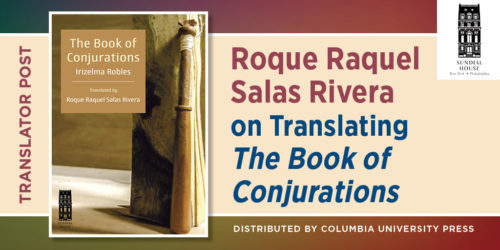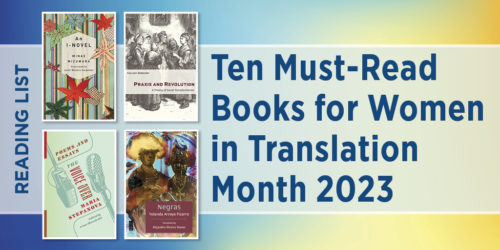Eunice Rodríguez Ferguson in Conversation with Hanna Askarpour about Sundial House

In May, an exciting collaboration unfolded between Columbia University Press and Sundial House, a publishing house founded in the Department of Latin American and Iberian Cultures at Columbia University. Their mission is to promote and showcase the voices of Latin American, Iberian, Latinx, and Hispanic Caribbean authors, both in their original languages and in English. To celebrate this new partnership and Hispanic Heritage Month, Hanna Askarpour interviewed Eunice Rodríguez Ferguson, a founding editor of Sundial House, about their remarkable initiative.
Q: Can you tell us about the history and mission of Sundial House?
Eunice Rodríguez Ferguson: Sundial House is revitalizing the literary legacy of the Hispanic Institute, founded at Casa Hispánica in 1920 as the Instituto de las Españas. One of the Institute’s core objectives was to publish “works of undisputed merit and of special value,” including the first edition of Nobel laureate Gabriela Mistral’s Desolación (1922). Sundial House honors that splendid legacy while expanding its scope.
Q: What types of books do you typically publish, and what themes or genres are you particularly interested in promoting?
Rodríguez Ferguson: Too few books published in the United States are works in translation. Sundial House responds to this circumstance by publishing either bilingual or English editions of international literary works of merit. To that end, Sundial House privileges translations into English of short stories and poetry by underrepresented authors who exemplify the richly diverse cultural manifestations of Latin America and the Iberian Peninsula.
Q: How do you ensure diverse representation within your publishing catalog, in terms of both the authors and the stories they tell?
Rodríguez Ferguson: The editorial board comprises educators, editors, and translators who hail from a variety of cultural contexts, including Argentina, Brazil, Puerto Rico, and the Basque Country, and who share a commitment to linguistic diversity, equity, and inclusion in publishing. Sundial House publishes the work of writers and translators of color and is committed to the transformative global potential of literature in translation. The editorial board has also endorsed the PEN America Manifesto on Translation, a call to redress historic racial and gender inequities in this field:
More of us should join the translators who have been acknowledging and working against historical injustices and their ongoing legacies, to ensure that translation communities in the U.S. play a meaningful role in counteracting disparities in power and prestige among the world’s languages and peoples. We ought to approach our work in full awareness of the responsibility we bear given the history and geopolitical positioning of the U.S. and the global hegemony of English. We must resist flattening the gamut of human experiences by rendering them according to an inward-looking U.S.-Anglophone worldview.
Sundial Houseʼs yearly call for proposals is open to book-length poetry or prose translations from Spanish, Portuguese, Catalan, Galician, Asturian, or indigenous languages. The judges are keenly interested in submissions that highlight an author whose work is not widely known in the United States and in translators who hail from communities that are underrepresented in the publishing world.
Our catalog includes a prize-winning translation of Irizelma Robles’s poetry by Roque Raquel Salas Rivera. The inaugural list also highlights the literary contributions of Claudia Ulloa Donoso (Perú), João Silvério Trevisan (Brazil), Gabriela Mistral (Chile), Carlos Pintado (Cuba), and Ana María Martínez Sagi (Cataluña).
Q: What steps do you take to support emerging Latin American and Hispanic authors, and how do you help them navigate the publishing industry?
Rodríguez Ferguson: We welcome unpublished translations into English of the work of authors from any of the cultures and languages of Latin America, the Caribbean, and the U.S.-based diaspora. The editorial board selects three proposals from literary translators for the Sundial Literary Translation Award, which includes a monetary prize, expert editing, and publication of all winning entries. Once published, the editors promote the work of each author through book presentations, international book fairs, book clubs, and other publicity initiatives to ensure that their titles reach a new community of readers, both in English and in the original language.
Two recently published authors, Claudia Ulloa Donoso and Yolanda Arroyo Pizarro, for example, were invited by Sundial House to be distinguished speakers at the Feria Internacional del Libro NYC. Free and open to all, the International Book Fair of the City of New York is a convergence space for those who speak and read in Spanish as well as for those who enjoy Hispanic literary traditions and creative innovation. The fair promotes the work of underfunded writers, translators, and editors from the Global South, whose participation is facilitated by the CUNY Center for Mexican Studies, NYU, and Columbia University. Events like this one will encourage conversations about their work and will allow Claudia and Yolanda to cultivate a global network of editors, agents, publishers, and fellow authors.
Q: Are there any specific challenges or opportunities you have encountered as a small press that publishes Latin American and Hispanic books, and how have you addressed them?
Rodríguez Ferguson: The key challenge is that every member of our editorial team collaborates with Sundial House on a voluntary basis, with conflicting professional priorities. We have yet to devise a fundraising strategy to ensure the sustainability of our efforts, so our limited budget is devoted solely to compensating translators and authors.
Q: Can you share any notable stories or memorable experiences related to publishing any specific works?
Rodríguez Ferguson: A moving moment of pride was listening to Yolanda Arroyo Pizarro recite one of the poems we edited, “Dios te salve Yemayá,” at the Whitney Museum of American Art.
This performance took place in the context of the first scholarly exhibition focused on Puerto Rican art to be organized by a large U.S. museum in nearly half a century. The show’s title, “No existe un mundo poshuracán: Puerto Rican Art in the Wake of Hurricane María,” also borrows a line from 2018 Philadelphia poet laureate Roque Raquel Salas Rivera, who will translate another title for Sundial House in 2024.
Q: How do you engage with readers and communities to promote your books and foster a sense of connection and belonging?
Rodríguez Ferguson: Sundial House has endeavored to make our academic home, Casa Hispánica (at 612 W. 116th St. in New York City), a multicultural hub for the Latin American, Iberian, Latinx, and Hispanic Caribbean communities in the greater New York City area. Sundial House editors have harnessed the intellectual resources and cultural expertise of their academic community to build a dynamic center for the pursuit and the dissemination of Latin American and Iberian literary arts and polylingual cultures.
We also partnered with Rutgers University and Word Up Community Bookshop to host an international colloquium of independent presses last April and to launch a series of book clubs, open to all. Word Up is a collectively operated bookshop and arts space in Washington Heights. As editors, we share their objective of providing a resource-rich site for immigrant communities to grow, learn, and celebrate multicultural identities.
Q: How do you see the role of the translator in comparison to the role of the author? Have you run into any issues trying to translate works?
Rodríguez Ferguson: We consider literary translation to be a creative art in its own right and a specialized form of writing. In this, we once again echo the sentiments of the PEN America Manifesto on Translation:
The lack of this acknowledgment has led not only to erasure of the translator’s labor, but also to a suppression of the social and political nature of the translator’s cultural work. In writing a translation, the translator establishes a set of interpretive relations with an existing text. The translator’s choices—including text selection—are inextricable from a given social and historical moment, and the translator’s aesthetic and ethical sensibilities shape the translated text for a new literary context, paving the way for dynamic and varied readings. To resort to notions of translation as purely mechanical reproduction or as “capturing” or being “faithful” to some aspect of the “original” eliminates the consideration of this cultural practice, thus reducing its artistic and intellectual possibilities—and also, necessarily, political ones—by attempting to confine the result to a single meaning. When seen as a particular kind of writing, translation emphasizes the myriad interpretations available and has the potential to combat the tendency to essentialize cultures and languages.
The only challenge we have encountered thus far has been in securing the translation rights to Ana María Martínez Sagi’s poems; otherwise, we have been quite fortunate in our negotiations with writers and literary agents.
Q: What future plans or initiatives do you have in mind to further promote Latin American and Hispanic voices in the publishing industry?
Rodríguez Ferguson: We wish to expand our list to include some of the nonhegemonic languages of Latin America and the Iberian Peninsula, such as Asturian, Galician, Basque, Nahuatl, and Garifuña/Karif, among so many others. We are also in search of a wider presence in independent bookstores, particularly those in the diasporic communities of urban centers in the United States.
Sundial House has been invited to participate in the Feria Internacional del Libro Guadalajara in November 2023 and also plans to attend both the Brooklyn Book Festival and the Miami Book Fair in 2024.
Q: Is there anything else youʼd like to tell us about Sundial House, its books, or its mission?
Rodríguez Ferguson: The cover images of three of our recent titles are the work of visual artists of color. The covers of Ice for Martians is by Scherezade García, a Dominican artist based in Brooklyn. The cover of Sundial House’s centennial edition of Gabriela Mistral’s Desolación is the work of Rafael Lara, an indigenous printmaker and educator from the Chiloé Archipelago in Chile. Rafael’s young students also illustrated several of the poems in this bilingual edition of Desolación. We plan to showcase the creative expression of underrepresented artists in future editions as well.
Categories:Columbia UniversityHispanic Heritage MonthNational Translation MonthSundial HouseTranslationWomen in Translation
Tags:Alejandro Álvarez NievesAna María Martínez SagiCarlos PintadoClaudia Ulloa DonosoDesolaciónEunice Rodríguez FergusonGabriela MistralHanna AskarpourHispanic Heritage Month 2023Ice for MartiansJoão Silvério TrevisanNTM2023Rafael LaraRoque Raquel Salas RiveraScherezade García








